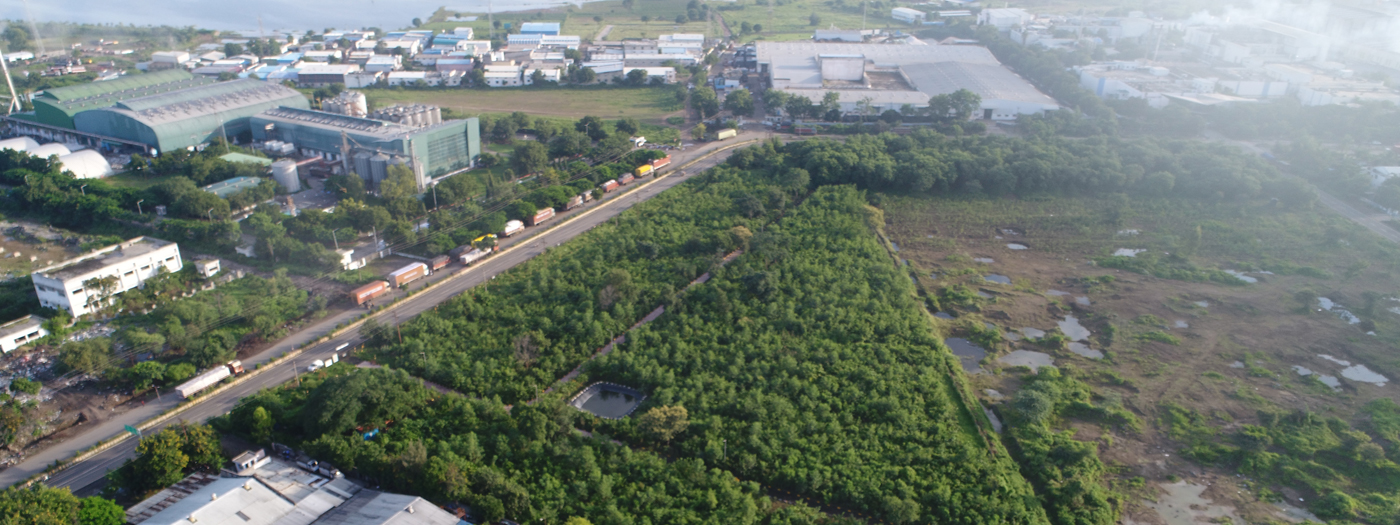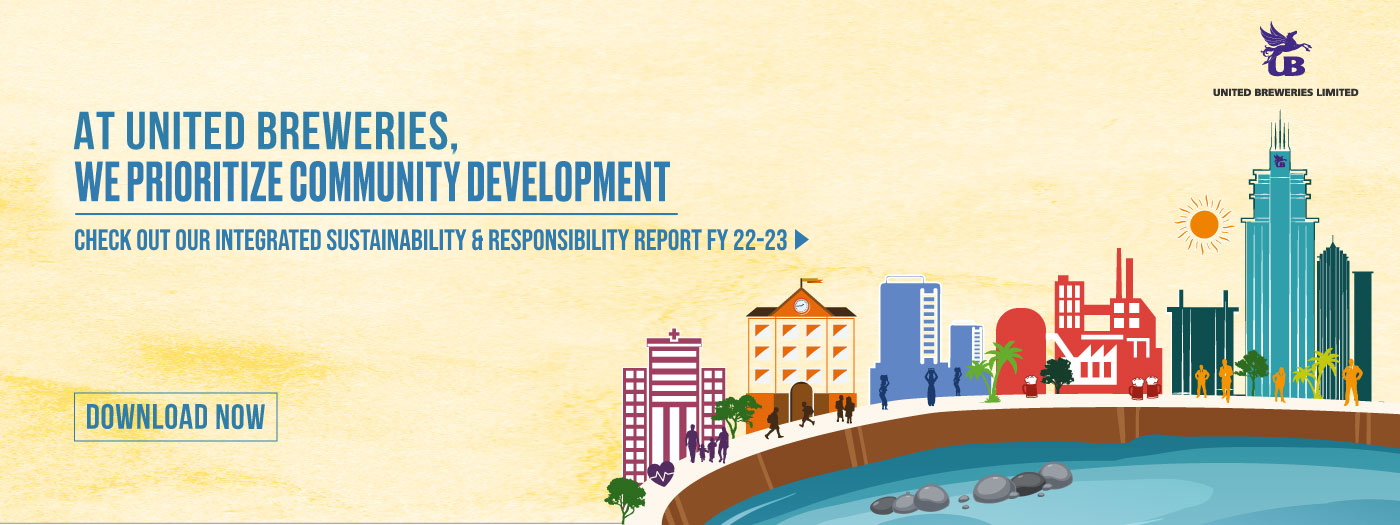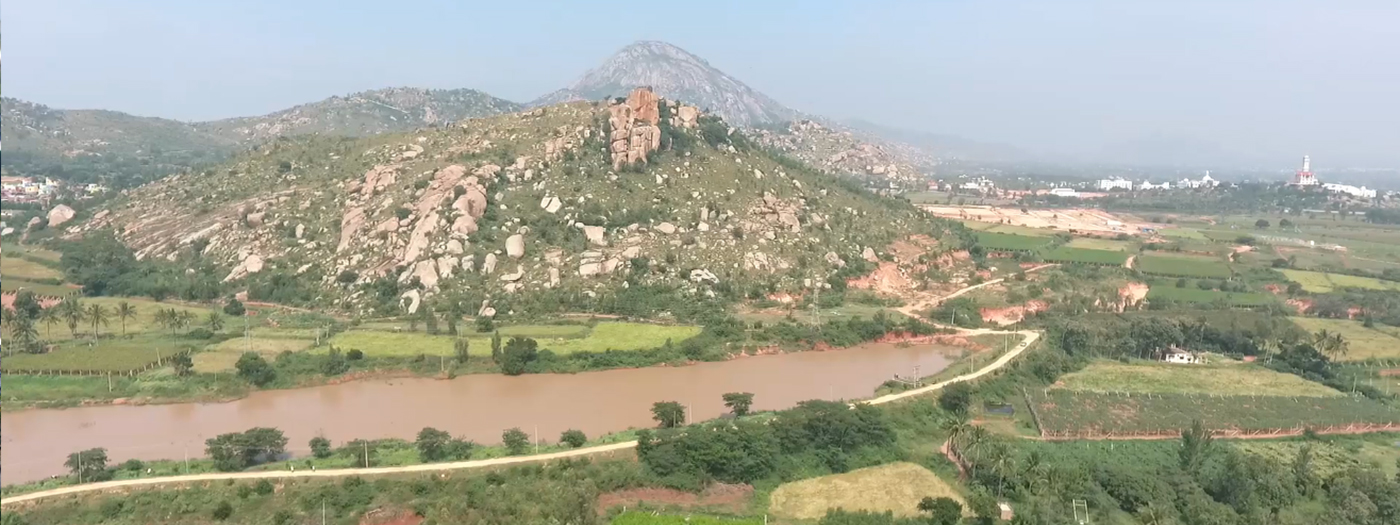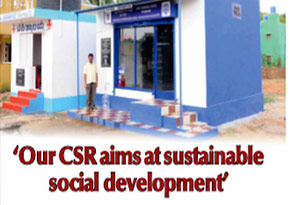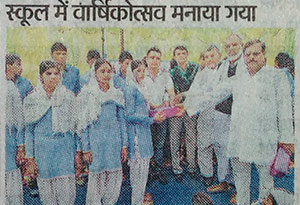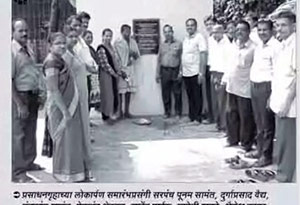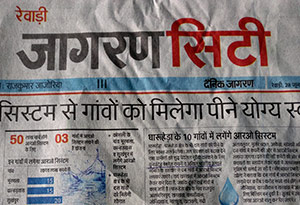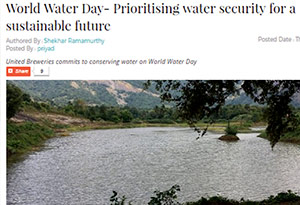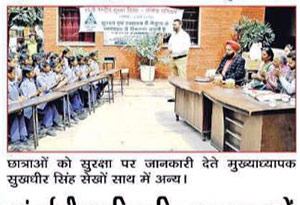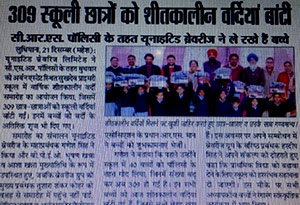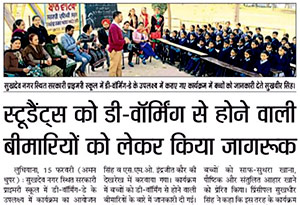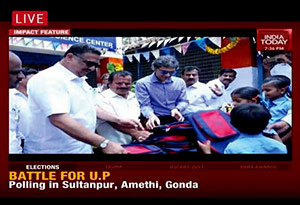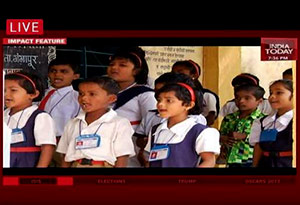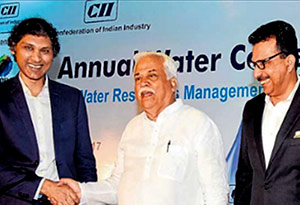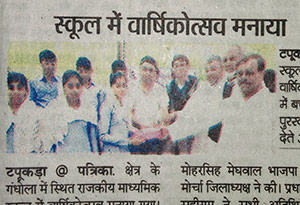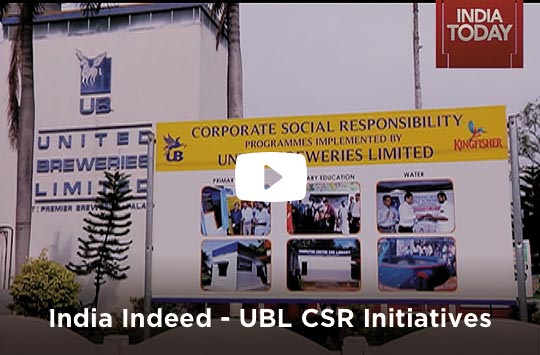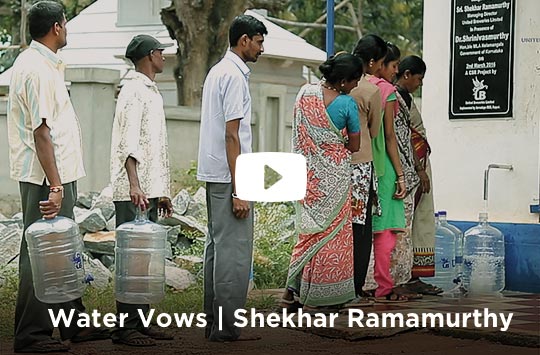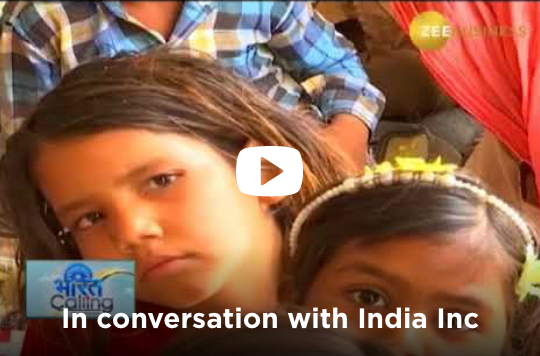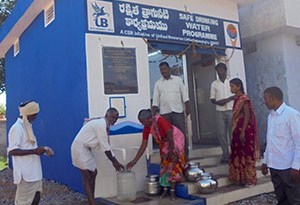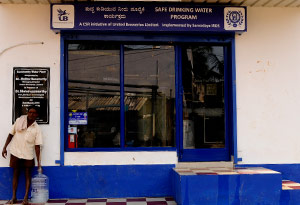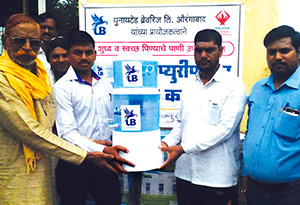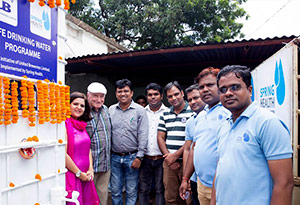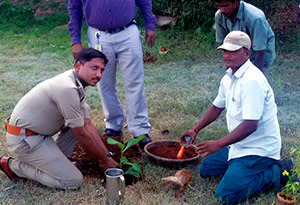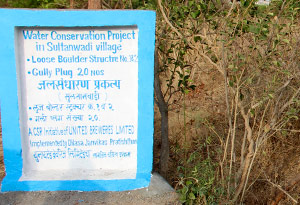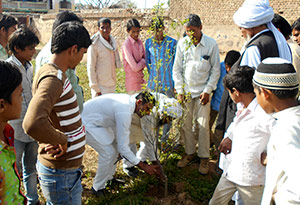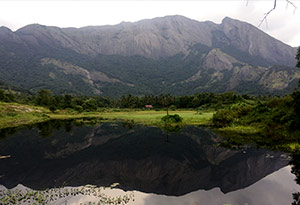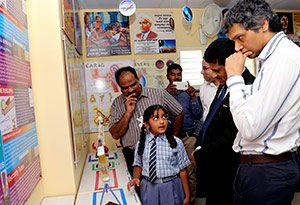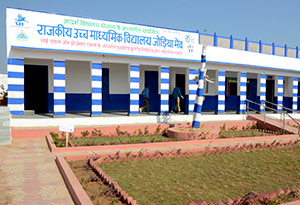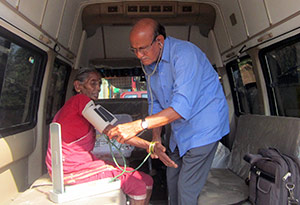Progress towards Brewing a Better India
Our Brew a Better India strategy is aligned with HEINEKEN's Brew a Better World (BaBW) 2030 strategy, contextualising it to India's unique challenges and market dynamics. It is a holistic approach to sustainability, focussing on 3 key pillars: Environmental, Social and Responsible.
The strategy and its ambitions reflect our deep-seated belief in the interconnectedness of our actions with the well-being of our planet, our country and its people. These ambitions are crucial in driving positive and sustainable growth for all our stakeholders.
 CSR Policy
CSR Policy Policy
United Breweries Limited firmly believes in sustainable development which is interpreted as growing our business in a socially and environmentally responsible way, while meeting the legitimate interests of our stakeholders. We also believe in taking an active role and responsibility in empowering local communities to achieve their ambitions. The company and its employees are committed to the community it works with and the environment it extracts its resources from. The needs of the community and the environment keep changing over time and therefore our CSR and Sustainability policy would be dynamic to be able to include the aspects which would help in paving the way for long term sustainable development. We will ensure that our CSR initiatives integrate social and environmental considerations, apply to all our operations, are incorporated in our governance, management, business strategy and day to day decisions and actions.
At United Breweries, we would invest in holistic welfare measures for our co-communities that would include water, sanitation and hygiene along with education and primary health. All our initiatives would be implemented after a thorough needs assessment of the community.
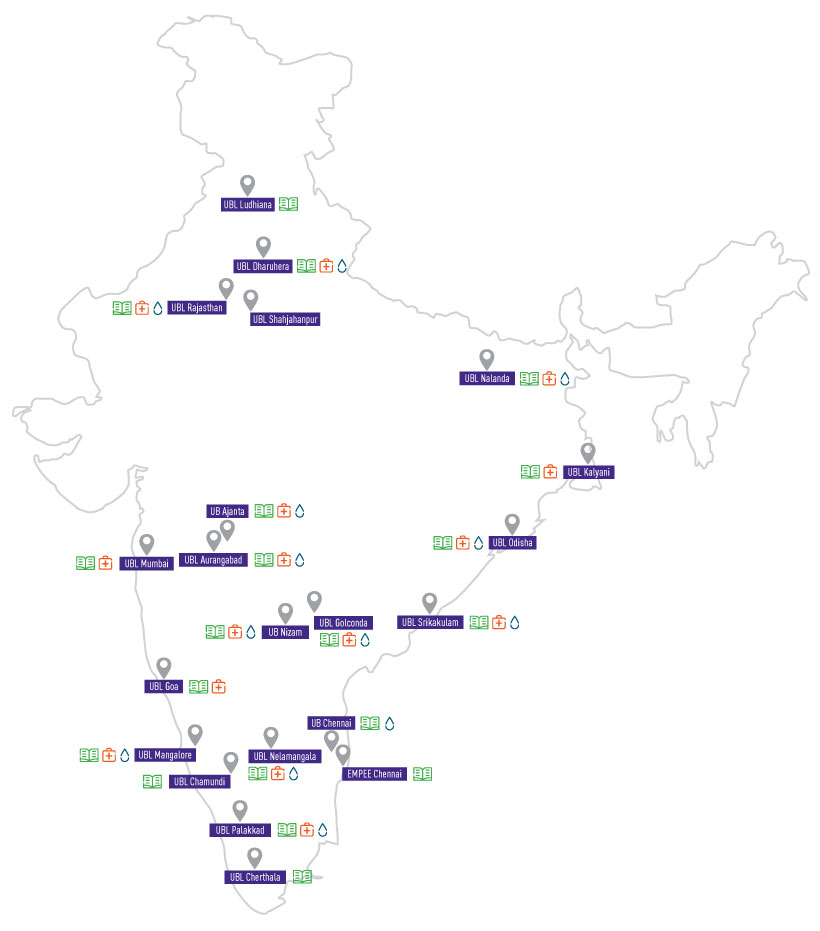
Hover on map to zoom
Drag on map to zoom
 CSR Policy
CSR Policy Guiding Principles
- Leverage our resources, expertise, services, relationships and influence for the benefit of our communities and our community partners
- Take community interests into account in our decision-making in the short and long-term
- Actively work towards ensuring availability and accessibility of safe drinking water and sanitation for all our co-communities
- Work towards improving availability and accessibility of education and health services for our co-communities
- Work towards environmental sustainability with particular focus on water conservation
- Regularly monitor outcomes of our initiatives and publicly report on our progress in a transparent and effective manner
 CSR Policy
CSR Policy Implementation Process
Building and Transforming communities requires focus, time, commitment and resources. The thematic areas have been carefully chosen to maximise the output of the corporate social responsibility initiatives. The programs have been solidified with the participation of business units, employees and the community that we work with and focus areas have emerged as:
- Water, Sanitation and Hygiene
- Education
- Primary Health
- Environmental sustainability
United Breweries Limited shall implement its CSR programs either directly or through partnerships with reputed non-profit organisations having expertise in the selected thematic areas. Emanating from the belief that our co-communities deserve attention on priority, the CSR implementation area has been defined as 10 km radius of UB operations and manufacturing facilities. The CSR initiatives shall be centrally driven by the Head-CSR at the Corporate Office under the guidance of the President. The responsibility of identification of project opportunities and allocation of funds would rest with the Corporate Office. In case of larger programs, the implementation responsibility would lie with the partner non-profit organisations and in case of smaller CSR projects, the implementation responsibility would rest with the Brewery HR. While Brewery HR leads would be responsible for supervision and monitoring of CSR programs at the brewery level, the overall responsibility of supervision and monitoring of the program would lie with Head-CSR.
 CSR Policy
CSR Policy Monitoring and Evaluation
A robust system of monitoring would be put in place to ensure effective implementation of the planned CSR initiatives. A monthly reporting system would be established for each of the programs which would be consolidated into quarterly and eventually the annual CSR reports. The output of the intervention would be gauged through a planned and actual comparison which would help identify the gaps, challenges faced in the process of implementation and solutions for the same. The project sites would be visited on a regular basis by brewery HR personnel and the CSR team to understand the physical progress.
A third party would be engaged to review CSR interventions on a three year frequency to ensure un-biased impact evaluation.
 CSR Policy
CSR Policy Committee for CSR
As per the Companies Act 2013, the Company has to set up a Corporate Social Responsibility Committee with representation by a minimum of three Directors of the Board, with at least one of them being an Independent Director. The CSRC will be responsible for formulation and approval of the company's CSR Policy, the activities to be undertaken and monitoring the CSR Policy and Programs from time to time.
The members of the CSR Committee are:
- Mr. Shekhar Ramamurthy- Member
- Mr. Steven Bosch- Member
- Mrs. Kiran Mazumdar Shaw- Member
- Mr. Madhav Bhatkuly- Member
- Mr. Sunil Alagh- Member
 CSR Policy
CSR Policy Program Details
Education
United Breweries would be helping to provide improved quality of primary education...
Read More
Program Details
Water
Water is a very broad subject and interventions on water are relevant both in the urban and rural context. The primary raw material for all UB products is water. Through its sustainability efforts, UB is constantly striving to reduce fresh water input in production of each hectolitre of beer and is also consistently working towards recycling of waste water coming out of production. The other water related initiatives include rainwater harvesting and de-silting of tanks and ponds. As a way forward, United Breweries intends to focus on availability of safe drinking water within this broad cause of ‘Water'. The company commits a significant proportion of its CSR budget to availability of safe drinking water for the communities residing in the vicinity of each of its 21 owned breweries. Over 140 villages comprising a population of over 6,00,000 would be covered under this program. The program will be implemented in partnership with reputed non-government organisations and the respective gram panchayats. It will be implemented for over 5 years, commencing in FY 2015-16.
Education
United Breweries would be helping to provide improved quality of primary education for its co-communities. It will adopt schools in the vicinity of its breweries, work on improvising teaching-learning methodology along with development of physical infrastructure. Each brewery shall adopt at least one primary school.
Health
The Company intends to improve the access to health care services for the co-communities. The breweries would establish Health Centres/Dispensaries/Mobile Medical Units, which shall provide free medical check-ups and basic medicines to the communities. Health camps would be carried out in the villages on a regular basis.
 Projects
ProjectsWater
 Projects
ProjectsSafe Drinking Water
It is indisputable that without water there is no life. Water is essential for the consumption of nutrients, cultivation of crops for food, survival of the flora and fauna and several other activities that sustain life on Earth. According to a 2011 report by The Economic Times, by 2020, India shall be a water stressed nation due to its increasing domestic use of water and industrialisation. Thus, with its water initiatives, UBL aims at giving a helping hand to the villages around its country wide breweries in their water related issues with its myriad projects. It actively communicates the same through street plays and local advocacy to encourage more and more efficient use of the facilities so that the reached areas shall gradually become self-dependent. This is the broadest domain under UBL's Corporate Social Responsibility.
- Establishing RO water plants
- Giving household water purifiers
- Deepening of wells
- Installing pumps
- Providing water stations
States Covered by UBL are:
Also Read
Conservation & Rejuvenation
It is indisputable that without water there is no life. Water is essential for the...
Read More
 Projects
ProjectsSafe Drinking Water
It is indisputable that without water there is no life. Water is essential for the...
Read More
Conservation & Rejuvenation
It is indisputable that without water there is no life. Water is essential for the consumption of nutrients, cultivation of crops for food, survival of the flora and fauna and several other activities that sustain life on Earth. According to a 2011 report by The Economic Times, by 2020, India shall be a water stressed nation due to its increasing domestic use of water and industrialisation. Thus, with its water initiatives, UBL aims at giving a helping hand to the villages around its country wide breweries in their water related issues with its myriad projects. It actively communicates the same through street plays and local advocacy to encourage more and more efficient use of the facilities so that the reached areas shall gradually become self-dependent. This is the broadest domain under UBL's Corporate Social Responsibility.
- Desilting lakes and wells
- Rejuvenating nallahs, wells and trenches
- Construction of overhead tanks
- Constructing dug-cum-bore wells and percolation ponds
- Constructing cement nala bunds
- Constructing gully plugs and gabions
- Land levelling
States Covered by UBL are:
 Projects
ProjectsResponsible Consumption of Alcohol
Responsible Consumption of Alcohol
Alcohol consumption is largely related to cultural and social influence on an...
Read More
Responsible Consumption of Alcohol
Alcohol consumption is largely related to cultural and social influence on an individual. India is a diverse nation with vast cultural variations among ethnic, religious and linguistics groups with varied drinking pattern across states. With a major rise in the number of drunken driving cases, sensitization on the effects of abuse of alcohol are the need of the hour.
Truck drivers are an essential link in our supply chain and their wellbeing is important for our growing economy. A majority of truck drivers consume alcohol either daily or often, increasing the possibility of drinking and driving. UBL has launched a “Responsible Consumption of Alcohol��? programme to reach out the truck drivers in our supply chain. The programme intends to cover all the truck drivers coming into our breweries.
Additionally, campaigns in collaboration with the media are being run to spread awareness on this topic, among the masses.
- Awareness generation and Sensitisation sessions with Truck Drivers
- Awareness generation campaigns in the media
 Projects
ProjectsPrimary Education
Primary Education
Primary education reveals the horizons that empower the recipients to establish...
Read More
Primary Education
Mini Science Centres
Primary education reveals the horizons that empower the recipients to establish a name of their own and help society in their own ways. It is the first step to becoming a contributing member of the community and no person should be deprived of the opportunity. Children in their early years are most receptive to information and so it is the best time for them to know the benefits of primary education. UBL lends a hand in promoting conducive learning environment to the schools in the villages around its breweries. The myriad projects range from unique Mini Science Centres to providing basic infrastructure support with the help of the NGOs in the areas.
- Installing working science models
- Making science education more interactive and interesting to the children
- The first of its kind Science Centres of the country
- Implementation partner - Ace Education Trust
- 7 target government schools
- 1,623 students benefitted
States Covered by UBL are:
School Adoptions
Primary education reveals the horizons that empower the recipients to establish a name of their own and help society in their own ways. It is the first step to becoming a contributing member of the community and no person should be deprived of the opportunity. Children in their early years are most receptive to information and so it is the best time for them to know the benefits of primary education. UBL lends a hand in promoting conducive learning environment to the schools in the villages around its breweries. The myriad projects range from unique Mini Science Centres to providing basic infrastructure support with the help of the NGOs in the areas.
- Revamping infrastructure
- Distributing books, bags, uniforms
- Establishing reading corners
- Kitchen sheds for mid-day meals
- Re-activating of school management committees
- Training teachers
- Summer camps
- 10 government primary schools supported
States Covered by UBL are:
Other Initiatives
Primary education reveals the horizons that empower the recipients to establish a name of their own and help society in their own ways. It is the first step to becoming a contributing member of the community and no person should be deprived of the opportunity. Children in their early years are most receptive to information and so it is the best time for them to know the benefits of primary education. UBL lends a hand in promoting conducive learning environment to the schools in the villages around its breweries. The myriad projects range from unique Mini Science Centres to providing basic infrastructure support with the help of the NGOs in the areas.
- Infrastructure development
- Providing furniture
- Distribution of study material
- Separate toilets for boys and girls
- Workshops in life skills, child safety and visual training
- Sports facilities
- Providing digital classroom equipment
- Providing nutritional supplements
- Supporting teachers salaries
- Celebration of events and important days
 Projects
ProjectsHealthcare
Healthcare
Primary healthcare is the building block of a human's body and catering to it is necessary...
Read More
Healthcare
PRIMARY HEALTHCARE
Primary healthcare is the building block of a human's body and catering to it is necessary for a decently functioning life. However, in rural India, the needs are either ignored or not easily accessible. Where centres are available, they are ill-equipped in terms of staff, beds, labs and even nurses and doctors. UBL makes an effort to reach the people around its breweries, with doctors and medicines and making them aware of how to make a healthy environment for themselves.
- Primary healthcare centres
- Primary healthcare centres
- Providing with medicines
- Full time nurses
- Consultation
PREVENTIVE HEALTHCARE
Primary healthcare is the building block of a human's body and catering to it is necessary for a decently functioning life. However, in rural India, the needs are either ignored or not easily accessible. Where centres are available, they are ill-equipped in terms of staff, beds, labs and even nurses and doctors. UBL makes an effort to reach the people around its breweries, with doctors and medicines and making them aware of how to make a healthy environment for themselves.
- Fumigation
- Rejuvenating nallahs, wells and trenches
- Constructing toilets
 Projects
ProjectsDisater Relief
Disater Relief
During the times when water shows its unforgiving side, the human kind strives...
Read More
Disater Relief
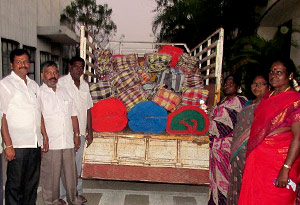
During the times when water shows its unforgiving side, the human kind strives to put a brave face forward. The loss is inevitable; families are left incomplete and property is irreparably damaged. However, the ability of one to uplift those in despair is what binds the species.
The Chennai floods of 2015 were one of India's most relentless natural disasters where 500 people lost their lives, 18 lakh residents were displaced and a loss of Rs.46,000-1,00,000 crores was accounted. In this mayhem of despair and cluelessness of Chennai, UBL through the Akshaya Patra Foundation, took to contributing to the aid of the victims. Besides providing food to 1,50,000 of the survivors, the Empee Brewery of Chennai distributed sarees, umbrellas, buckets, jugs, mats, biscuits and sanitary napkins by visiting the desecrated land in person on 8th December, 2015.
The employees of EBL also contributed their one's day salary for relief and rehabilitation of the areas in Sithitaipatti village of Cuddalore taluk. Over a hundred families were helped with relief packages which were balanced in food material like rice, milk powder, instant noodles, bread and biscuit; clothing, bedspreads etc. The village head expressed gratitude towards EBL mentioning that they were the foremost in coming forth to help the languished. The Chennai Brewery also distributed 500 mats and bed sheets each to Aranvoyal and Tiruvur panchayats.
While disasters are nature's way of voicing its exploitation, it is imperative that those in the privileged areas come forward to assist the distressed and help combat the unfortunate circumstances.
 Environment
EnvironmentEnvironment
WATER SUSTAINABILITY
The environment needs sincere care and protection for it is the origin of it is the...
Read More
GREEN INITIATIVES
The environment needs sincere care and protection for it is the origin of it is the...
Read More
RENEWABLE ENERGY
The environment needs sincere care and protection for it is the origin of it is the...
Read More
 Projects
ProjectsEnvironment

SUSTAINABILITY
The environment needs sincere care and protection for it is the origin of everything that sustains life on Earth. UBL understands its responsibility towards the same and takes pressing steps in its manufacturing operations for the most efficient use of the natural resources. These are essential to highlight the need for conserving the surroundings and taking initiatives that ensure that the unwritten but cardinal bond between UBL and the environment leads to mutual growth.
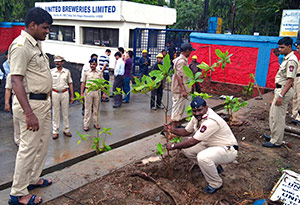
GREEN INITIATIVES
The environment needs sincere care and protection for it is the origin of everything that sustains life on Earth. UBL understands its responsibility towards the same and takes pressing steps in its manufacturing operations for the most efficient use of the natural resources. These are essential to highlight the need for conserving the surroundings and taking initiatives that ensure that the unwritten but cardinal bond between UBL and the environment leads to mutual growth.
States covered
- Tamil Nadu – vegetables were grown in the unit garden of Empee Chennai to make it greener with a healthier environment
- Bihar – associates of the unit planted saplings around the brewery, UBL Nalanda
- Andhra Pradesh – 147 badam trees were planned in UBL Srikakulam
- Telangana – under the government's Haritha Haram Programme, 4,700 saplings were planted by the breweries, UBL Nizam and UBL Golconda
- Maharashtra – The state Excise and Sales Tax Department joined UBL Mumbai to plant 1,500 plants in support of the government's initiative of planting 20 million plants on 1st July, 2016

RENEWABLE ENERGY
The environment needs sincere care and protection for it is the origin of everything that sustains life on Earth. UBL understands its responsibility towards the same and takes pressing steps in its manufacturing operations for the most efficient use of the natural resources. These are essential to highlight the need for conserving the surroundings and taking initiatives that ensure that the unwritten but cardinal bond between UBL and the environment leads to mutual growth.
- 19 out of 21 breweries use only agricultural waste (such as rice husk, saw dust etc.) as boiler solid fuel
- Wind energy has replaced 75% of the conventional power in the Nelamangala, Mangalore and Chamundi breweries
- Roof top solar power plants shall replace 10-14% conventional power usage in Golconda, Ellora and Taloja
- Total carbon footprint reduction in FY 2016-17 was 3,351 tons of Carbon dioxide emission
 Spreading Cheer
Spreading CheerWater
Safe Drinking Water & Water Conservation, Telangana
It is indisputable that without water there is no life...
Read More
Safe Drinking Water, Maharashtra
It is indisputable that without water there is no life...
Read More
Water
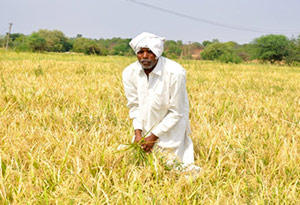
SAFE DRINKING WATER AND WATER CONSERVATION, Telangana
Padmavathi Venkatareddy is a marginal farmer of Gunthapalli village in Medak District who owns a small piece of land adjacent to the water plant. Like many other farmers in the village, he was unable to manage his household expenses with agriculture. The prevailing draught conditions and reducing water level in the bore well was drastically affecting the yield from his land. Faced with adversities, he was considering an alternate livelihood. One day, it struck him that the waste water drained from the water plant newly established by UBL in his village, is let out to the drainage without any use. He thought that the water could be diverted to his field to save the crop this year. Spending his own labour for one day, he dug a small canal diverting the waste water from the water plant to his field. Unlike the other villages, the water source is not the ground water in Gunthapalli. It is the water seeping from the hills and collected in the well, the only water source for the entire village which was created by UBL. The water in the well does not possess any minerals or chemicals dangerous for health and hence it has become a source of water for Venkatareddy. He got a record yield of 35 bags of paddy this year. He offers prayers to the water plant every day before he enters into his field just like they do to God in temples. For him God is in the form of the UBL water plant.
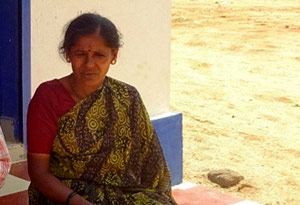
SAFE DRINKING WATER, Karnataka
Jayamma is a 45 year old woman who lives with her family of 5 in Veerananjipura. Even though she understood that the water from the tap is not good for health, she had no option but to consume it. She was unable to travel to the neighbouring villages to fetch purified water and even her sons had no time as they left early for work. She would boil the water that was available. However, the consumption of gas went up considerably. There were times when she had to fetch water from Nelamangala, at a distance of about 4 km for which she had to pay about INR 30 per can. All these expenses were adding up and the financial burden of basic needs was rising. With the introduction of the RO water plant in her village, she not only has access to clean drinking water, she even volunteered to run the plant.
“Paying INR 5 for 20 litres of pure water from the RO plant is nothing compared to paying a rupee for a small pouch of water. Ever since the RO plant has become functional, I regularly take 3-4 cans of water in a week. Now I use clean water for drinking as well as cooking.��?
- Jayamma, Veerananjipura
SAFE DRINKING WATER, Maharashtra
The life of any house wife in Ramraiwadi is almost the same; the routine activities of waking up early, cleaning the house, cooking food and taking care of other chores. The male members are mostly employed with the nearby industries. Chandrakala's life also follows the same pattern, her husband works in a press and her son works in a company. The only difference between she and the other women in her village is that whenever she gets free time, she goes to other villagers' houses and discusses about clean water, health and their correlation. This transition happened over time. During the lean season, the family got water from MIDC which they stored in traditional matkis (earthen pots) and used it for cooking and drinking. The water was there but so were the health problems. They were surprised to learn that the water they were consuming was the reason behind the majority of their health complications. They had to spend nearly INR 500 on every visit to hospital as the children suffered from vomiting, dysentery and stomach pain. The medical expense was too much for her family whose monthly income was around INR 7,000. The other villagers faced the same plight.
It was during this time that United Breweries and Dilasa Janvikas Pratishthan visited the village and carried out awareness campaigns regarding the problems of unsafe drinking water.
“Janseva (serving the people) is one thing which I have always liked doing, so when the Dilasa representatives came, I decided to help them in implementing the project. If there is a chance to get clean water, why let go of it?��? asks Chandrakala.
Chandrakala has since become the resource person for her village. She helped and guided the entire team in spreading awareness. Her enthusiasm in the project has been an inspiration for other women. She was reminiscent of what it was like before the introduction of the water purifier;
“Those were terrible times, it was like we had water but it was as good as it not being there. We could not use it. It would smell bad and was yellowish in color. We got diseases also. At the same time we could not even live without water. Now it's quite good, we still use the MIDC water, but we fill it in the purifier first. It is clear and does not smell at all.��?
She sends her grandchildren to school with water bottles filled with safe and clean water as the water available in the school is not of good quality. She makes sure that the filter and purifier is regularly washed and kept clean. Chandrakala asserts that none of this would have been possible without the UB project. She is forever thankful for this project and is still actively involved in mobilising the village women. The success of this project in Ramraiwadi would never have been possible without the efforts of Chandrakala, who even though may seem like doing nothing different from other housewives, did an exceptional job of mobilising the people and spreading the thought of “Clean water, Safe water.��?
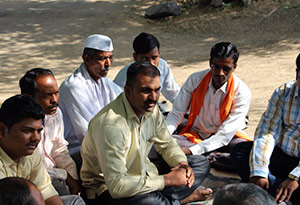
WATER CONSERVATION, Maharashtra
Lawki, a hamlet of Kasoda village in Aurangabad had been reeling under the effect of water scarcity and the availability of water had been a challenge after January till the monsoons. A majority of the villagers were dependant on the sale of agricultural produce and milk for an income.
Agriculture was mostly restricted to the Kharif season. With villagers just about managing to source drinking water, cultivating twice a year was a distant dream for them. Lawki being a hamlet, did not even have a water tanker coming which was otherwise available for Kasoda.
“During the summer months, we had to ration whatever water was available. We had no water tanker coming into our basti. In the last year, before the cement nallah bund, not a single farmer cultivated in the Rabi season and there was hardly any water left for the cotton��?
Nanasahib Mati, Farmer, Lawki Village
The cattle feed that the villagers grew was reduced as a result of which many villagers were forced to give away their cattle as they could not afford to buy the cattle feed. A village of 300 households, every family was struggling for water.
In partnership with Dilasa, an NGO, UBL constructed a cement nallah bund to hold the water and help increase the percolation. As a result, the water level in the 15 wells has increased and the 12 bore wells that had run dry now pump water again. Even during the summer months, the village now has sufficient water for personal consumption as well as a second crop. Around 150 acres of land around the cement nallah bund now has sufficient water for the second crop.
 Spreading Cheer
Spreading CheerPrimary Education
Mini Science Centre, Karnataka
You have donated a very beautiful, useful and valuable Mini Science Centre...
Read More
School Adoption, Rajasthan
Rizwana, a young girl was one of the students enrolled in class...
Read More
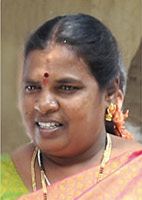
- M. Nagarathna
Headmistress, Govt. Higher Primary School
KS Hundi, Karnataka
MINI SCIENCE CENTRE, Karnataka
“Respected Sir,
You have donated a very beautiful, useful and valuable Mini Science Centre to our school. With this Mini Science Centre, our school has become popular in our Taluk and it is like an additional feather in our cap. Many neighbouring schools' science teachers have visited our school along with their students and have praised this Mini Science Centre a lot. I am very thankful to your company for setting up such a useful science centre at our school. This is a great gift to the children of our Panchayat area for learning science. This really helps the teachers by making teaching science easier and the students are more interested when they visit this Mini Science Centre. My co-teacher Mr. P. Umashankar is taking a personal interest in making this science centre popular and all our other colleagues are very confident and are working hard to bring good results to the school. I am very thankful to you all for gifting such a wonderful science centre��?
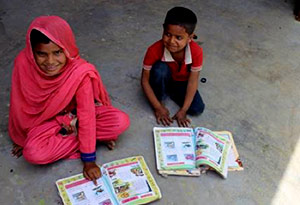
SCHOOL ADOPTIONS, Rajasthan
Rizwana, a young girl was one of the students enrolled in class I of the Senior Secondary School in Jodiya Meo, Rajasthan. She was soon noticed by the teachers for her meticulous school and homework and her punctuality. She actively participated in the class room activities and had an immense drive to learn. However, a month after her enrolment she stopped coming to school. While the teachers did notice her absence in school, they assumed she had some work and would come back to school soon.
Rizwana did not turn up to school for a month and that worried the Resource Teachers employed by SST in the school. Raju, a Resource Teacher, went looking for her house and after several attempts, located it. He met with her mother there who reassured him that Rizwana would be in school the next day. When Rizwana did not attend school the next day, Raju visited her house again. This time the mother shared with the teacher that while she had been persuading Rizwana to go back to school, she had refused. They called Rizwana to understand what was stopping her from attending school. Rizwana shared that the teacher at the school reprimanded her for not coming to school in uniform. Her father, a truck driver was out and till he came back the mother could not buy her a new uniform due to lack of money.
Raju deliberated and came up with a solution. He helped the mother join a Self Help Group for a loan for Rizwana's uniform. On his personal guarantee, the group which was initially hesitant about lending money to a new entrant, extended a loan of INR 500 to Rizwana's mother.
Rizwana has a uniform now and she no longer has to miss school. She continues to show tremendous progress in her learning and has caught up with her missed school time. A small initiative by a concerned teacher has helped bring Rizwana, a bright young girl, back to school.
 Spreading Cheer
Spreading CheerHealthcare
Health Camp, Rajasthan
Hasanghori is one of the innermost hamlets of the Gualda village in Rajasthan...
Read More
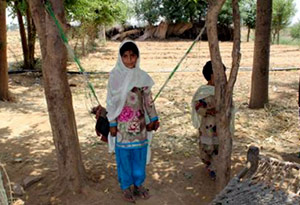
Health Camp, Rajasthan
Hasanghori is one of the innermost hamlets of the Gualda village in Rajasthan. Though the village lacks in several necessities like roads, it has an Upper Primary School as it realises the need for children's growth. Sir Syed Trust, UBL's partner NGO in Rajasthan organised a health camp, Nai Pahal, in the area and the school was one of the 10 selected for piloting.
The aim was to refer any child who was suffering with a chronic disease to the hospital to avoid any grave consequences. A few children were diagnosed with minor nose/ throat/ eyes problems but unfortunately it was realised that while the check-up was in progress, a few children had escaped the premises owing to their fear of doctors. One of those was a little girl, Muskan. To make the camp as worthwhile as possible, one of the members of the team visited the village to gather the fled students for their own benefit and landed on Muskan's doorstep. Further pursuing her Mother to motivate her, Muskan reluctantly returned to the camp where it was discovered that she had pus oozing from one of her ears that inhibited her auditory sense.
Ultimately, she was referred to the hospital where she was regularly treated for free, being cured to a great extent and further improvement is expected with future treatments.
 Annual Reports
Annual ReportsAnnual Reports
 Media
MediaRecognition
- UBL is the proud recipient of the Govt. of Rajasthan sponsored prestigious Bhama Shah Award for its initiatives in promoting primary education in the government schools of Bhiwadi. The Hon'ble Ministers of State, Mrs. Vasudhara Raje (Chief Minister) along with Mr. Vasudev Devnani (State Education Minister), Mrs. Kiran Maheshwari (State Higher Education Department Minister), and Mr. P.N. Sharma (Chairman of CSRL) graced the award ceremony on 28th June, 2017 and presented the honours to Ms. Tushara Shankar (Head-CSR) and Mr. Sandeep Khola (Manager-HR) of UBL.
- Spiritz, a renowned magazine in the acohol industry, covered UBL's CSR and sustainable development efforts in its March, 2017 edition. An interview with Ms. Tushara Shankar delved into UBL's CSR Vision, the projects implemented across different thematic areas of health, education and water and how CSR is internalised in UBL. UBL also received the gold award by Spiritz for its safe drinking water and education initiatives.
- The Safe Drinking Water programme was featured as one of the top 10 CSR programmes in the NHRD national conference.

Telangana
Needs of the villagers
10 villages around the two breweries – UB Golconda and UB Nizam were facing severe drought pertaining to the failure of monsoon. The main source of water, the bore wells had excess fluoride and this heavily affected the health of the residents due to water borne diseases.
In one of the target villages, Gunthapalli, there was no water source at all.
Efforts by UBL
With implementation partner, ASSIST, UBL is supporting a community water scheme and 8 drinking water plants, which use the RO technology, to provide safe drinking water to the 10 villages in the vicinity of the two breweries.
In Gunthapalli, a 45 ft. well was dug, a submersible pump installed and a complete community water scheme was sponsored for over 350 families.
In Sangareddy, a bore well pump with pipes and fittings was installed to ensure safe drinking water to the villagers.
Outreach

Karnataka
Needs of the villagers
In the 5 villages around the brewery – UB Nelamangala, the water was reported unfit for direct drinking by the CGWB due to high fluoride content. People were either travelling to the neighbouring villages which increased their expenditure or consumed the hard salty tube well water.
Efforts by UBL
Three RO Community Water Plants were installed in Bomanahalli, Gangadharpalya and Veerananjipura to provide the much needed clean and safe drinking water to the residents of the villages. The implementation partner, SIRDS, helped reach the target audience with much effectiveness. UBL continues to support and monitor the project and an increase in the consumption of water cans has been noted.
Outreach

Maharashtra
Needs of the villagers
Among the chosen 5 villages in the vicinity of the breweries – UB Ajanta and UB Ellora, half of the villages received medium quality drinking water for 7-8 months and then were dependent on tankers. There was low water availability in the dug wells.
In Kasoda, school children were dependent on the neighbourhood houses for water during school hours.
Furthermore, hand pumps and bore wells were non-functional in some villages.
Efforts by UBL
Household water purifiers were distributed which made the available water better for consumption. UBL's partner, Dilasa Janvikas Prtishthan suggested so, taking into account that RO facility was not required since the available supply of water was consumable without negative health effects.
Outreach

Haryana
Needs of the villagers
Around UBL-Dharuhera, the 10 villages face problems like contaminated water because of the unplanned urbanisation that is taking place. 95% of the households do not have fitted taps in the pipelines because of which the water drains out during the supply hours. Villagers consume this water without boiling and so risks for health problems are immeasurably increased. Other problems like unequal distribution of water and discrimination between the villagers simply elevates the issues of drinking water.
Efforts by UBL
UBL has recently partnered with Akhil Bhartiya Gramin Utthan Samiti to carry this initiative forward. The water plants in the villages are under construction with the aim to not only provide clean drinking water but also to mobilise the communities. UBL ultimately wants these plants to be community based, owned and managed.
Outreach

Odisha
Needs of the villagers
Many of the 18 chosen villages around the brewery – UB Khordha, are far from government supported water supply and the people demand open wells/ tube wells/ government hand pumps. People receive 7-8 months of water supply and then are dependent on water tankers.
Efforts by UBL
This is the newest project of UBL in partnership with Spring Health Water India Pvt. Ltd.
Under this entrepreneur driven project; which aims at not only providing safe drinking water but also generating employment, Chlorine dioxide is used to purify water. Additionally, three water stations have been provided to the District Headquarter Hospital, Khordha which are being utilised by the admitted and visiting patients and their attendants. A water station has also been provided to the hospital kitchen to improve the conditions in which the patients' food is prepared.
Water tanks have been ensured to the local communities.
Outreach

Karnataka
Needs of the villagers
In the Badagabellur village of Mangalore, the water was running off in the absence of rain-water harvesting activities, creating months of water scarcity. This further restricted farming to only 1 crop/year on a land that was capable of cultivating more.
Other problems were defunct bore wells and poor water levels that affected the crop.
Efforts by UBL
A nallah was rejuvenated in Badagabellur, that improved the water table in the required areas of cultivation and the farmers can finally harvest 2 crops/year. This rainwater harvesting activity helped retain the water that would otherwise run off and put it to efficient use in 350-400 hectares of land. The water recharge potential of the same is 2,70,000 kilolitres.
In Nelamanagla's Bomanahalli village, desilting of the lake and recharging of ponds and bore wells has improved the capacity, putting the available water to a more efficient use. An overhead tank with a capacity of 1 lakh litres has been constructed.
In the villages around UBL-Chamundi, water levels have been improved with percolation ponds, dug-cum-bore wells and recharging of the available trenches and wells.
Outreach

Maharashtra
Needs of the villagers
The selected 10 villages around the breweries – UB Ajanta and UB Ellora receive an average rainfall of 320 mm, making it highly difficult for agriculture. They were also met with droughts for a consecutive period of 3 years.
Villages in Aurangabad, Ambelohal, Kasoda, Ghanegaon and Jogeshwari were struggling with water scarcity and were dependant on water tankers. The bore wells and hand pumps were also rendered non-functional.
In Sultanwadi, climate change and poor management of natural resources has limited agriculture. There were no existing soil and water conservation structures. This resulted in the unfortunate migration of the villagers for a period of 7-12 months. This area also comes under high priority for the CGWB where 80-90% agriculture is rain fed.
Efforts by UBL
UBL partnered with Dilasa Janvikas Pratishthan for their expertise in the matter. Water storage structures were constructed in villages of Aurangabad along with bunds for ground water percolation.
The only well in Ambelohal was deepened by 21ft. to solve water scarcity problems. Furthermore, 15 water storage tanks were established in different villages for the people to use them at their convenience.
In Gangapur taluka, 13 cement nallah bunds were constructed to check the flow of water, recharge the surrounding areas and help dying rivers hold water during monsoon. These help check soil erosion and the flow of water which consequentially have made previously dry bore wells pumping water once again. The water recharge potential of this nallah bund is 6,187 kilolitres.
The problems in Sultanwadi are challenging and are being combated with construction of earthen dams, trenches, gully plugs, gabions among others. Preparations to record the monsoon of 2017-18 have also been made so that the future projects can be of greater effectiveness.
Outreach

Rajasthan
Needs of the villagers
The people in the 10 villages around the brewery – UB Rajasthan, are small land holders and poverty is an unfortunate everyday reality for them. Money lenders sometimes charge 36-50% interest and so good crop harvest is extremely crucial for the population.
The agricultural land is undulated and the flowing rainwater further adds to the stress. The water levels are low and the younger population is constantly in search of occupational activities.
Efforts by UBL
With implementation partner, Sir Syed Trust, UBL has started the Integrated Natural Resource Management Project in Rajasthan. The project mainly recharges ground water levels by rainwater harvesting. Land levelling has been carried out to improve the in-situ rain water harvesting to improve the productivity of the land. Other practices include bunding and planting that would meet the occupational requirements of the people, promoting fruit orchards and establishing vermi-compost pits.
This project also gives importance to increasing the livelihood options of the local community and the role of women in spreading the value of the initiatives.
Outreach

Kerala
Needs of the villagers
The Chellankavu villagers could only cultivate 2 crops due to the limited capacity of the lake and it was required to enhance the structure with the water from the nearby nallah also being put to effective use.
Efforts by UBL
The lake at Chellankavu in Palakkad were rejuvenated to enhance their water holding capacity. In Chellankavu, the depth of the lake was increased by 1.5m and the Northern, Eastern and South Eastern sides were strengthened. A check weir was constructed in the Eastern side of the nallah to divert the water to the lake. The water recharge potential has now become 3,00,000 kilolitres.
Further, recharge of ponds, percolation pits and roof water harvesting has increased water yield from bore wells and these efforts have allowed for a third crop to be irrigated by the farmers, thus, putting the land to its optimal use.
Outreach

Other States
In Odisha, 4,000 individuals have been ensured with water tanks.
Water harvesting has been carried out at UB Dharuhera, Haryana with recharging of ponds and wells.
Water structures have also been recharged in Tamil Nadu, Telangana and Bihar.

Other States
In Odisha, 4,000 individuals have been ensured with water tanks.
Water harvesting has been carried out at UB Dharuhera, Haryana with recharging of ponds and wells.
Water structures have also been recharged in Tamil Nadu, Telangana and Bihar.

Other States
In Odisha, 4,000 individuals have been ensured with water tanks.
Water harvesting has been carried out at UB Dharuhera, Haryana with recharging of ponds and wells.
Water structures have also been recharged in Tamil Nadu, Telangana and Bihar.

Other States
In Odisha, 4,000 individuals have been ensured with water tanks.
Water harvesting has been carried out at UB Dharuhera, Haryana with recharging of ponds and wells.
Water structures have also been recharged in Tamil Nadu, Telangana and Bihar.

Other States
In Odisha, 4,000 individuals have been ensured with water tanks.
Water harvesting has been carried out at UB Dharuhera, Haryana with recharging of ponds and wells.
Water structures have also been recharged in Tamil Nadu, Telangana and Bihar.

Other States
In Odisha, 4,000 individuals have been ensured with water tanks.
Water harvesting has been carried out at UB Dharuhera, Haryana with recharging of ponds and wells.
Water structures have also been recharged in Tamil Nadu, Telangana and Bihar.

Karnataka
Needs of the villagers
The children in any community are as liable to a progressive environment as the elders. It was required that the students in the villages about the brewery – UB Chamundi, be equipped with better infrastructure and methods of practical learning to encourage them to attend school.
Efforts by UBL
In Nanjankud Taluk, UBL partnered with Ace Education Trust to intervene in 7 government primary schools by building Mini Science Centres. These are the first of their kind projects in the country that enable the students to grasp scientific concepts via practical methods. Each centre has 30-60 working science models ranging from topics on space, environment, biology and several others.
Models on water harvesting, use of solar energy and other sources of energy conservation have been given much importance, considering that these are of direct application in the villages.
Some of the several other efforts by UBL include electrical wiring of the models, installing fans, painting the walls, fixing first aid kits and fire extinguishers and redecorating the areas around the Mini Science Centres to attract the school children.
Feedback also says that the students are satisfied with the teachers who have put the efforts of UBL to efficient use.
Outreach

Rajasthan
Needs of the villagers
The target, Tijara Block, Bhiwadi near UB Rajasthan basically comprises of meo-muslims which is a community with a literacy rate of 12.2%. They believe that sending their off springs to government schools shall weaken their cultural and religious identity besides, that girls and boys of the family are looked upon as a boon in the household activities and fields respectively.
Those who still manage to go to schools are faced with several issues like untrained teachers. Hundreds of girl students drop out from 5th to 6th grade, owing to lack of separate toilets, unsafe locations of the schools and commuting problems. The infrastructure and facilities neither attract new students nor encourage the enrolled ones to stay.
Efforts by UBL
10 primary schools under a tripartite project between the District Government, UBL and the Sir Syed Trust are supported under this initiative. UBL propagates the message that primary education is essential and children should not be deprived of it.
Infrastructure revamping has been done in 9 schools and the new buildings are more welcoming with better space for the students to learn. The kitchen sheds in 3 schools have been improved for the preparation of the mid-day meals. To maintain a balanced student teacher ratio, assistance was provided towards teachers' salaries at Gandhola Government School. Besides this, management committees and teacher training programs have gained momentum with UBL's interventions.
Annual functions are organised where students perform skits, group and solo performances with prizes distributed at the end. Furthermore, World Earth Day, 2017 saw planting of nearly 50 trees at the Govt. Higher Sec. School, Joriya Mev, Bhiwadi to inculcate in students and staff the much required sensitivity towards their surroundings.
Outreach

Karnataka
Needs of the villagers
The students of the varied schools need constant assistance that stretches beyond classrooms and explores areas of co-curricular activities, celebration of important days, proper sanitation, safety, healthcare and other facilities. These form an integral part for any institution to sustain its beneficiaries and the village schools needed to broaden their approach in the same.
Efforts by UBL
The primary education activities are spread the widest in Karnataka; in specified villages of Mysore, Mangalore and Nelamangala. These initiatives are based on the overall infrastructure development of the schools and providing them with basics that standardise their education and make it more qualitative.
A dining hall cum stage was constructed at Government Higher Primary school in Halimavu village, in Mysore, which is used to celebrate important dates like 15th August. Along with the KS Hundi School, computer training was also organised in it to equip the children with the basic functioning of the technology that drives today's world. Other improvements in the designated villages of Mysore include a water purifier in the Government Boys' Hostel in Nanjangud, separate toilets for boys and girls in the KS Hundi School and an RCC roof for the Aanganwadi in Kudumboor.
Students were provided with notebooks in Angaragundi Muslim Higher Primary School, Kejaru Higher Primary School and Jokatte Higher Primary School. These schools were also sensitised with child safety workshops, visual training sessions and exposed to life skill training programmes. Besides these, mid-day meals are supported for 12 schools in Mangalore by bringing on board the Akshaypatra Foundation.
In Nelamangala's Gangadharapalya School, besides constructing toilets, a compound wall was put up to combat students' safety issues and windows were renovated with aluminium and mesh for mosquito control. The brewery has also taken complete responsibility for educating the children of a deceased contract labourer.

Kerala
Needs of the villagers
The students of the varied schools need constant assistance that stretches beyond classrooms and explores areas of co-curricular activities, celebration of important days, proper sanitation, safety, healthcare and other facilities. These form an integral part for any institution to sustain its beneficiaries and the village schools needed to broaden their approach in the same.
Efforts by UBL
The main areas of work are Cherthala and Palakkad where students are provided with shoes and socks, supported with mid-day meals and nutrition supplements. Children of Kanjikode Lower Primary School in Palakkad have also been given educational aids.

Telangana
Needs of the villagers
The students of the varied schools need constant assistance that stretches beyond classrooms and explores areas of co-curricular activities, celebration of important days, proper sanitation, safety, healthcare and other facilities. These form an integral part for any institution to sustain its beneficiaries and the village schools needed to broaden their approach in the same.
Efforts by UBL
The main areas of work are Cherthala and Palakkad where students are provided with shoes and socks, supported with mid-day meals and nutrition supplements. Children of Kanjikode Lower Primary School in Palakkad have also been given educational aids.

Others
Needs of the villagers
The students of the varied schools need constant assistance that stretches beyond classrooms and explores areas of co-curricular activities, celebration of important days, proper sanitation, safety, healthcare and other facilities. These form an integral part for any institution to sustain its beneficiaries and the village schools needed to broaden their approach in the same.
Efforts by UBL
Besides improvements in infrastructure and education quality, schools have been given sports facilities and digital classroom equipment. This ensures the overall development of the students, giving them the opportunity to discover their potential beyond books.
Furthermore, the primary school at the Malkapur village has been provided with 65 desk benches and the school at Kothlapur with tables, chairs, cupboards and a public address system.

Needs of the villagers
In India, 70% of the population lives in the rural areas but due to the rural-urban divide, the primary health services provided to them are deplorable. According to the 2016 Rural Health Statistics Report, in rural Karnataka, the average doctor patient ratio is 1:90,000. Other states too suffer with poorly staffed health centres where people bear heavy expenditure on primary healthcare due to lack of equipment and travelling.
Efforts by UBL
UBL has set up primary healthcare centres and organises camps around its breweries to provide the villagers with affordable and approachable means to take care of their health.
In Karnataka, the activities are spread the widest where in Gangadharapalya health centre provides consultation and medical aid to the people. A full time nurse with doctors' visits thrice a week have been arranged to ensure that regular check-ups are taking place. Camps in Kurikatta in collaboration with Inchara Foundation and in Bykampady provide them with medicines and doctors' aid.
West Bengal's Anne Sullivan Institution for visually impaired children is provided with healthcare services and nutritional support through a health centre. The centre also provides free medical facilities to the residents of the institution and the families living in the vicinity of the brewery. 334 individuals have benefitted from the services.
Other health centres that provide free medicines and check-ups include those in the Bethoda village of Goa; Maharashtra's Palekhurd, Dongrepada, Bhangsi Mata Gad and the Bhawan Baba Balika Ashram of Aurangabad; and in the Pudussery Panchayat of Kerala. People in the Mallepally village of Telangana have received special treatment in paediatrics and gynaecology.
Areas of camps are Chainpura village of Bihar where eye check-ups and distribution of spectacles took place, Gwalda in Rajasthan, Tamil Nadu and Kerala. A health camp in Odisha's Khurda municipality was organised where people got free medical consultation and medicines.
Outreach

Needs of the villagers
Villages usually struggle with cutting the disease at its roots. Hygienic grounds with no breeding mosquitoes, clean toilets and awareness about maintaining healthy habits are necessary to ensure that the disturbance is prevented before it strengthens or even arises.
Efforts by UBL
UBL aims at creating awareness and lending a helping hand to enable the villagers around its breweries to breed healthy living grounds for themselves. Fumigation and fogging activities to carry out mosquito control are done in Karnataka located Gangadharapalya, villages in West Bengal and Andhra Pradesh. In Goa, a lot of importance is given to women's health and talks on preventive health were organised on Women's Day in the Bethoda village. To elevate the same cause, sanitation facilities and toilet units were also constructed for women.


